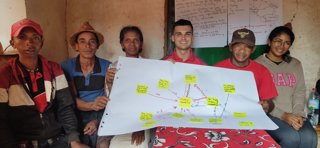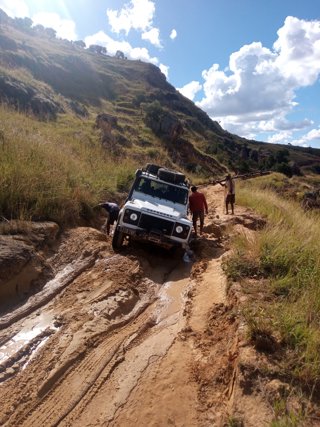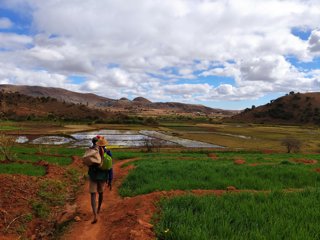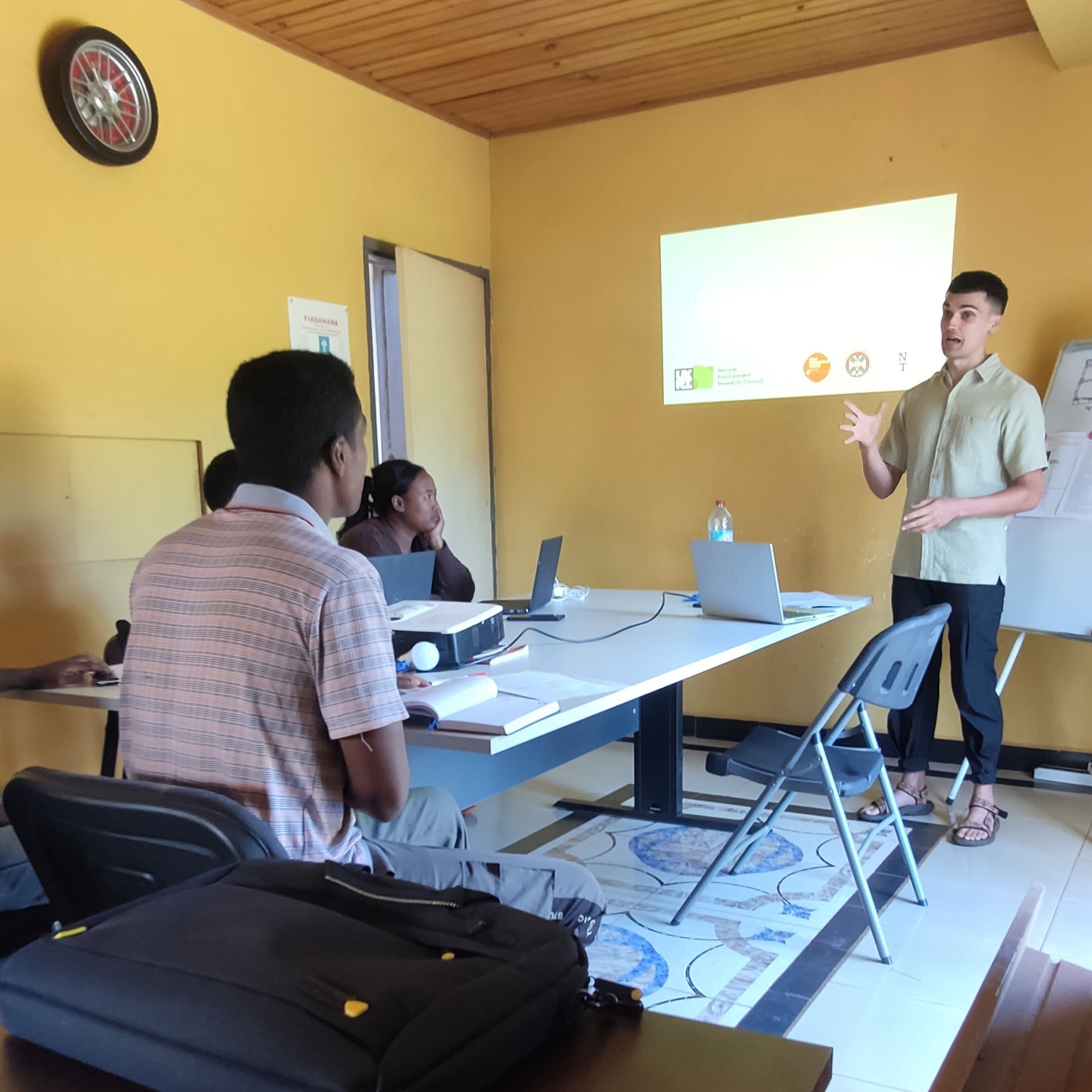Elliot Convery Fisher is a PhD researcher at the University of Edinburgh and Royal Botanical Gardens, Edinburgh. His research examines fire use in grasslands and savannahs and the effect of fire on rare plants. He uses this work to inform conservation efforts in endangered fire-driven ecosystems. We caught up with Elliot to find out more about his research and fieldwork.
What was the background and wider context of your research?
Madagascar is an 'isle of fire'. Annual wildfires engulf its grasslands and savannas, or grassy biomes, during the dry season leading to concerns about reduced agricultural productivity, deforestation and soil erosion. Despite attempts to curb these human-lit fires through prohibition, Madagascar has struggled for a century to achieve success.
Addressing the challenge of sustainable fire management requires a comprehensive understanding of fire users and their practices. However, there has been a notable lack of research on fire use practices in Madagascar. To bridge this gap, our research focuses on studying the fire practices of fire users in the Betsileo communities, located in the mountainous centre of Madagascar.
By delving into who uses fire, what fire is used for, why fire is utilised and when fire is employed, my team aimed to shed light on the dynamics and motivations behind fire use in these communities. Our study seeks to fill an important knowledge gap and contribute to informed approaches for sustainable fire management in Madagascar.

Valuable knowledge: researchers and participants proudly display the fruits of their collaborative efforts, a mental map of dorotanety (wildfire).
What questions did you set out to answer and how?
Using a combination of interviews and focus groups, we set out to answer two main research questions:
-
How does fire contribute to the livelihoods of rural Malagasy communities in Madagascar’s grassy biomes?
-
What do stakeholders perceive to be the key drivers of uncontrolled wildlife in Madagascar’s grassy biomes?
What are your main findings to date?
The main findings to date are that fire is essential to local livelihoods. Whilst fire is used for a variety of reasons, some practical, some cultural and others criminal, it is in agriculture where the properties of fire stand out. Fire is a fast, efficient and effective way to manage land from a livelihood perspective. It helps to quickly clear crop fields which otherwise would be hard physical work, and it can be used to convert areas of dry unpalatable grass into highly nutritious new growth when timed with the seasonal rains. In places which have received little support in terms of agricultural inputs and technologies, such as in rural Betsileo communities, fire is essential for people to make a living from the land.
A second key finding is that fire stakeholders (government officials, fire users, conservation professionals) view the ‘fire problem’ differently. There is disconnect in understanding between what fire users view as the key issues causing uncontrolled wildfires and what individuals who are responsible for designing and implementing fire management plans view as the key issues.

Conquering the treacherous road: our 4x4 vehicle valiantly struggles through the muddy terrain, and this is dry season!
What will be the wider impact of your research?
The impact of the research extends to multiple fronts. Firstly, it directly contributes to ongoing discussions among a consortium of conservation bodies, government officials, researchers and local communities in Madagascar. At this crucial moment, when stakeholders are open to alternative perspectives on fire management, our work provides valuable insights and often unheard perspectives on the fire problem in Madagascar's grassy biomes. By informing these discussions, we aim to shape the future of fire management in the country.
Furthermore, the research serves as a replicable template for understanding the intricate links between fire use, local livelihoods and unwanted fires around protected areas throughout Madagascar. This broader application enables the development of culturally sensitive and locally specific fire management initiatives. By expanding the scope of our findings, we aim to facilitate effective fire management strategies that not only mitigate the ecological and societal impacts of uncontrolled fires but also support sustainable livelihoods for local communities across the country.
Do you have a highlight from your fieldwork?
During my fieldwork in Madagascar, navigating the treacherous roads became a memorable highlight. Constant vehicle breakdowns and the need to create makeshift roads tested our determination. On one particularly challenging road, we encountered British tourists who underestimated the conditions and overestimated the abilities of their rental car. We stopped to assist them, surprising them with our British accents in a land with few foreigners. This experience reminded me of the immense difficulties faced by local communities who must walk for hours to reach basic amenities. Despite the challenges, it reinforced the importance of understanding their realities and the significance of our research. Overall, the highlight of my fieldwork was the combination of physical obstacles, unexpected encounters and reflections on the hardships endured by the local population.

Heading home but coming back: community members gracefully navigate the vibrant agricultural landscape. We aim to return to Madagascar, sharing the research findings to empower these communities.
What will you take away from your fieldwork and how will you use this going forward?
What’s next? The coming phase involves the vital task of analysing the collected data and translating it into a comprehensive written account. This fieldwork serves as a crucial pillar of my overarching PhD research, forming the foundation of my understanding of fire use in the region.
Looking forward, we are committed to returning to Madagascar next year, once the writing phase is complete. It is essential to my team to share our findings with the local community members and project stakeholders. This act of knowledge dissemination was a common request from all those who participated in the research and we are determined to fulfil it. I firmly believe that addressing Madagascar's 'fire problem' requires actively engaging with and involving the key stakeholders in the process.
By keeping our promise and sharing the research outcomes, we aim to contribute to tangible change. It is through genuine collaboration, open communication and the dissemination of knowledge that we can work together to make a lasting difference. This fieldwork has taught me the importance of accountability and the significance of ensuring that research translates into meaningful action.
Elliot’s work is supported by Feedback Madagascar, Ny-Tanintsika and the Royal Geographical Society (with IBG) Albert Reckitt Award.
Follow Elliot on Twitter @elliotdcfisher and Instagram @Elliotconveryfisher
Elliots's research was supported by the Albert Reckitt Award through the Society's Postgraduate Research Award scheme.
Find out more about the full range of grants available to support students and researchers with their fieldwork.


